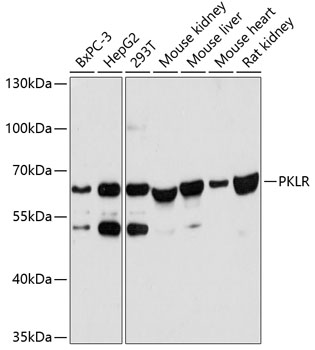Metabolism Antibodies 1
Anti-PKLR Antibody (CAB12084)
- SKU:
- CAB12084
- Product Type:
- Antibody
- Reactivity:
- Human
- Reactivity:
- Mouse
- Reactivity:
- Rat
- Host Species:
- Rabbit
- Isotype:
- IgG
- Antibody Type:
- Polyclonal Antibody
- Research Area:
- Metabolism
Description
| Antibody Name: | Anti-PKLR Antibody |
| Antibody SKU: | CAB12084 |
| Antibody Size: | 20uL, 50uL, 100uL |
| Application: | WB |
| Reactivity: | Human, Mouse, Rat |
| Host Species: | Rabbit |
| Immunogen: | Recombinant fusion protein containing a sequence corresponding to amino acids 446-556 of human PKLR (NP_000289.1). |
| Application: | WB |
| Recommended Dilution: | WB 1:500 - 1:2000 |
| Reactivity: | Human, Mouse, Rat |
| Positive Samples: | BxPC-3, HepG2, 293T, Mouse kidney, Mouse liver, Mouse heart, Rat kidney |
| Immunogen: | Recombinant fusion protein containing a sequence corresponding to amino acids 446-556 of human PKLR (NP_000289.1). |
| Purification Method: | Affinity purification |
| Storage Buffer: | Store at -20'C. Avoid freeze / thaw cycles. Buffer: PBS with 0.02% sodium azide, 50% glycerol, pH7.3. |
| Isotype: | IgG |
| Sequence: | PLSR DPTE VTAI GAVE AAFK CCAA AIIV LTTT GRSA QLLS RYRP RAAV IAVT RSAQ AARQ VHLC RGVF PLLY REPP EAIW ADDV DRRV QFGI ESGK LRGF LRVG DLVI VVT |
| Gene ID: | 5313 |
| Uniprot: | P30613 |
| Cellular Location: | |
| Calculated MW: | 58kDa/61kDa |
| Observed MW: | 62kDa |
| Synonyms: | PKLR, PK1, PKL, PKR, PKRL, RPK |
| Background: | The protein encoded by this gene is a pyruvate kinase that catalyzes the transphosphorylation of phohsphoenolpyruvate into pyruvate and ATP, which is the rate-limiting step of glycolysis. Defects in this enzyme, due to gene mutations or genetic variations, are the common cause of chronic hereditary nonspherocytic hemolytic anemia (CNSHA or HNSHA). Multiple transcript variants encoding different isoforms have been found for this gene. |
| UniProt Protein Function: | PKLR: one of three rate-limiting enzymes in glycolysis. It catalyzes the transfer of a phosphate group from phosphoenolpyruvate (PEP) to ADP, yielding one molecule ATP and a pyruvate molecule, which is a central metabolic intermediate that can be used as a building block or oxidized further. There are several mammalian isozymes of pyruvate kinase encoded by different genes. The L type predominates in liver, and the M type in muscle and brain. Two alternatively spliced human isoforms have been described: the R- and L-types. |
| UniProt Protein Details: | Protein type:Nucleotide Metabolism - purine; Carbohydrate Metabolism - pyruvate; EC 2.7.1.40; Carbohydrate Metabolism - glycolysis and gluconeogenesis; Kinase, other Chromosomal Location of Human Ortholog: 1q21 Cellular Component: cytosol Molecular Function:pyruvate kinase activity Disease: Adenosine Triphosphate, Elevated, Of Erythrocytes; Pyruvate Kinase Deficiency Of Red Cells |
| NCBI Summary: | The protein encoded by this gene is a pyruvate kinase that catalyzes the transphosphorylation of phohsphoenolpyruvate into pyruvate and ATP, which is the rate-limiting step of glycolysis. Defects in this enzyme, due to gene mutations or genetic variations, are the common cause of chronic hereditary nonspherocytic hemolytic anemia (CNSHA or HNSHA). Multiple transcript variants encoding different isoforms have been found for this gene. [provided by RefSeq, Jul 2008] |
| UniProt Code: | P30613 |
| NCBI GenInfo Identifier: | 8247933 |
| NCBI Gene ID: | 5313 |
| NCBI Accession: | P30613.2 |
| UniProt Secondary Accession: | P30613,O75758, P11973, |
| UniProt Related Accession: | P30613 |
| Molecular Weight: | 58,494 Da |
| NCBI Full Name: | Pyruvate kinase PKLR |
| NCBI Synonym Full Names: | pyruvate kinase, liver and RBC |
| NCBI Official Symbol: | PKLR |
| NCBI Official Synonym Symbols: | PK1; PKL; PKR; RPK; PKRL |
| NCBI Protein Information: | pyruvate kinase PKLR |
| UniProt Protein Name: | Pyruvate kinase PKLR |
| UniProt Synonym Protein Names: | Pyruvate kinase 1; Pyruvate kinase isozymes L/R; R-type/L-type pyruvate kinase; Red cell/liver pyruvate kinase |
| Protein Family: | Pyruvate kinase |
| UniProt Gene Name: | PKLR |
| UniProt Entry Name: | KPYR_HUMAN |
View AllClose





![PKLR Monoclonal Antibody [PPKLRAT] (CPAB0111) PKLR Monoclonal Antibody [PPKLRAT] (CPAB0111)](https://cdn11.bigcommerce.com/s-rd6ounxcu2/images/stencil/590x590/products/58337/63519/pklr-monoclonal-antibody-ppklrat-cpab0111__76524__11101.1706534976.jpg?c=1)

